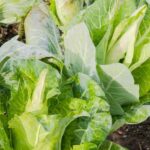Can you use preen on vegetable gardens? This is a common question among gardeners who are looking for effective weed control methods. Preen is a popular weed control product, but its use in vegetable gardens can be a topic of debate. In this article, we will explore the use of Preen in gardening, specifically focusing on its use in vegetable gardens.
Preen is a widely used weed control product that is designed to prevent weed seeds from germinating and growing in various types of gardens. It is known for its effectiveness in minimizing the need for manual weeding and promoting healthy plant growth. However, when it comes to using Preen in vegetable gardens, there are certain factors that need to be considered to ensure the safety and health of the garden.
In the following sections, we will delve into the purpose of Preen, its potential use in vegetable gardens, as well as the pros and cons to help you make informed decisions about using this product in your own vegetable garden. We will also discuss alternative weed control methods and potential risks associated with using Preen in vegetable gardens, along with tips for safely incorporating it into your gardening routine.
Whether you are a beginner or experienced gardener, understanding the usage of Preen in your vegetable garden is essential for maintaining its health and productivity.
The Purpose of Preen
Preen is a popular weed control product used by gardeners to prevent unwanted plants from growing in their gardens. It contains the active ingredient trifluralin, which forms a barrier in the soil that inhibits seed germination, effectively preventing weeds from taking hold in the garden. Additionally, Preen also promotes soil health by preventing weed growth and thus reducing competition for water and nutrients.
One of the main purposes of using Preen in vegetable gardens is to eliminate weeds that can compete with vegetable plants for water, nutrients, and sunlight. By creating a weed-free environment, Preen helps to maintain the overall health and productivity of the vegetable garden. This can result in higher yields and healthier vegetable plants.
However, there are some considerations to keep in mind when using Preen in vegetable gardens. One potential downside is that Preen doesn’t discriminate between weed seeds and vegetable seeds. This means that if not applied correctly, it can inhibit the germination of vegetable seeds as well as weed seeds. Additionally, while Preen is labeled as safe for use around established vegetables, it should not come into contact with plant foliage or be incorporated into the soil after planting.
| Purpose of Preen | Weed Control and Soil Health |
|---|---|
| Prevents unwanted plants from growing | Inhibits seed germination |
| Promotes soil health by reducing weed growth | Reduces competition for water and nutrients |
Can You Use Preen on Vegetable Gardens
Preen is a popular weed control product that many gardeners use to keep their gardens free from unwanted plants. However, when it comes to using Preen in vegetable gardens, there are some important factors to consider. In this section, we will explore the pros and cons of using Preen in vegetable gardens to help you make an informed decision for your garden.
One of the main advantages of using Preen in vegetable gardens is its effectiveness in controlling weeds. Preen works by creating a barrier on the soil surface that prevents weed seeds from germinating, ultimately reducing the need for manual weeding. Additionally, Preen contains a pre-emergent herbicide that targets weed seeds without harming established plants, making it a convenient option for maintaining tidy and healthy vegetable beds.
On the other hand, there are some drawbacks to using Preen in vegetable gardens. While it may effectively control weeds, Preen can also inhibit the growth of desirable plants if not used correctly.
Some vegetable crops may be more sensitive to the active ingredients in Preen, leading to stunted growth or even death. Furthermore, there is concern about the potential harm that chemical herbicides can have on soil health and beneficial organisms such as earthworms and microorganisms essential for plant growth.
Ultimately, whether or not to use Preen in your vegetable garden comes down to careful consideration of its benefits and risks. By weighing the pros and cons and following best practices for application, you can make an informed decision that supports the health and productivity of your vegetable garden.
| Pros | Cons |
|---|---|
| Effectively controls weeds | Potential harm to desirable plants if used incorrectly |
| Convenient option for weed management | Potential harm to soil health and beneficial organisms |
Best Practices for Using Preen in Vegetable Gardens
When it comes to using Preen in vegetable gardens, there are a few best practices to keep in mind to ensure the health and productivity of your garden. Preen is a popular weed control product that provides an effective and convenient way to keep weeds at bay. Here are some best practices for using Preen in your vegetable garden:
- Read and follow the label instructions carefully: Before applying Preen in your vegetable garden, be sure to read and follow the label instructions provided by the manufacturer. This will ensure that you use the product safely and effectively.
- Avoid direct contact with plant foliage: When applying Preen in your vegetable garden, take care to avoid direct contact with the foliage of your vegetables. This will help prevent any potential harm to your plants.
- Apply Preen on a calm day: Choose a calm day without strong winds to apply Preen in your vegetable garden. This will help prevent the product from drifting onto desirable plants.
While using Preen can offer effective weed control in vegetable gardens, it’s important to consider alternative methods as well. Some organic alternatives include mulching, hand weeding, and using natural herbicides, such as vinegar or citrus-based solutions.
Ultimately, when using Preen in your vegetable garden, it’s important to weigh the pros and cons and consider alternative methods for weed control. By following best practices and considering all options, you can make an informed decision for maintaining a healthy and thriving vegetable garden.
Alternative Weed Control Methods for Vegetable Gardens
When it comes to maintaining a healthy and flourishing vegetable garden, effective weed control is essential. While Preen can be a useful tool for managing weeds in gardens, some gardeners may prefer to explore alternative methods for controlling unwanted plant growth. Here are some alternative weed control methods that can be used in vegetable gardens:
- Mulching: Applying a layer of organic mulch, such as wood chips or straw, around your vegetable plants can help suppress weed growth by blocking out sunlight and preventing weed seeds from germinating.
- Hand weeding: Regularly inspecting your vegetable garden and manually removing weeds by hand is a labor-intensive but effective method for keeping unwanted plants at bay without the use of chemicals.
- Cover cropping: Planting cover crops like clover or rye during the off-season can help smother weeds, improve soil health, and prevent erosion in vegetable gardens.
These alternative methods not only provide natural solutions for controlling weeds in vegetable gardens but also contribute to the overall health and vitality of the soil. By avoiding chemical herbicides like Preen, gardeners can promote a more eco-friendly and sustainable approach to gardening.
It’s important to weigh the pros and cons of using chemical weed control products like Preen versus implementing alternative methods that prioritize environmental stewardship and long-term soil health. Ultimately, the choice of weed control method for your vegetable garden will depend on your personal gardening philosophy, level of commitment to sustainability, and specific needs and challenges within your garden space.
Understanding the Potential Risks of Using Preen in Vegetable Gardens
Preen is a popular weed control product that is commonly used in gardens to help maintain the health and appearance of the landscaping. However, when it comes to using Preen in vegetable gardens, there are some potential risks that gardeners should be aware of before applying this product.
Impact on Soil Health
One of the potential risks of using Preen in vegetable gardens is the impact it can have on soil health. While Preen is designed to prevent weed growth by inhibiting seed germination, it can also affect the growth of desirable plants, including vegetables. Some gardeners have reported that Preen can leach into the soil and impact the health and growth of their vegetable crops.
Residual Effects on Plants
Another risk to consider when using Preen in vegetable gardens is the residual effects it can have on plants. There have been concerns raised about the potential for Preen to linger in the soil and affect future plantings. This can be especially problematic for edible crops, as any residual chemicals could potentially be absorbed by the plants and transferred to those consuming them.
Potential Environmental Impact
Additionally, there are concerns about the potential environmental impact of using Preen in vegetable gardens. Some studies have raised questions about the impact of certain chemicals found in weed control products on local ecosystems and water sources. This raises important considerations for gardeners who want to maintain sustainable and eco-friendly gardening practices.
Gardeners who are considering using Preen in their vegetable gardens should carefully weigh these potential risks against the benefits of weed control before making a decision. Additionally, exploring alternative weed control methods may provide a more suitable approach for maintaining a healthy and sustainable vegetable garden.
Tips for Safely Using Preen in Vegetable Gardens
Read and Follow the Label Instructions
When using Preen in your vegetable garden, it is crucial to carefully read and follow the label instructions provided by the manufacturer. The label will provide important information regarding the application rate, timing, and any specific precautions or restrictions for use in vegetable gardens. By following the instructions on the label, you can ensure that you are using Preen safely and effectively in your garden.
Avoid Direct Contact With Plants
While using Preen in your vegetable garden, it is important to avoid direct contact with desirable plants. Preen should be applied around established plants and carefully worked into the soil to prevent it from coming into contact with the foliage or roots of your vegetables. This will help minimize any potential negative effects on your edible crops while still effectively controlling weeds in your garden.
Store Preen Properly
Proper storage of Preen is essential for safely using it in your vegetable garden. Make sure to store the product in its original container, tightly sealed, and away from children and pets. Additionally, store Preen in a cool, dry place according to the manufacturer’s recommendations to maintain its effectiveness and reduce any potential risks associated with improper storage.
Overall, when used correctly and with caution, Preen can be a valuable tool for controlling weeds in your vegetable garden. By following these tips for safely using Preen, you can minimize any potential risks while enjoying the benefits of weed control in your garden.
Conclusion
In conclusion, Preen can be a useful tool for controlling weeds and promoting soil health in vegetable gardens. However, it is essential to weigh the pros and cons before using this product. While Preen can effectively prevent weed growth and conserve moisture in the soil, there are potential risks to consider, such as its impact on beneficial insects and potential harm to certain vegetable plants.
When considering whether to use Preen in your vegetable garden, it is important to prioritize the health and well-being of your plants and the surrounding ecosystem. It’s crucial to explore alternative weed control methods that may be more suitable for your specific needs and goals. Whether it’s mulching, hand weeding, or using organic herbicides, there are other options available that can effectively manage weeds without causing harm to your vegetable garden.
Ultimately, making informed decisions about using Preen in your vegetable garden involves considering all aspects of its impact on plant health, soil quality, and environmental well-being. By weighing the pros and cons, exploring alternative methods, understanding potential risks, and implementing best practices for safe use if chosen, you can make choices that support a healthy and thriving vegetable garden.
Frequently Asked Questions
What Should You Not Use Preen On?
Preen should not be used on any edible plants or within a vegetable garden. This product is specifically designed for use on ornamental garden plants and should not come into contact with any food crops.
Is Preen Safe for Vegetable Gardens?
Preen is not considered safe for use in vegetable gardens. While it may effectively prevent weed growth, the chemicals in Preen can potentially harm or contaminate the vegetables being grown, making it unsuitable for use in this type of garden.
Can You Put Preen Around Tomatoes?
It is not recommended to put Preen around tomatoes or any other edible plants. The chemicals in Preen could be absorbed by the tomatoes and end up being consumed by humans, posing a potential health risk. Therefore, it is best to avoid using Preen near any food-producing plants.

If you’re looking to get into vegetable gardening, or are just looking for some tips on how to make your current garden better, then you’ve come to the right place! My name is Ethel and I have been gardening for years. In this blog, I’m going to share with you some of my best tips on how to create a successful vegetable garden.





